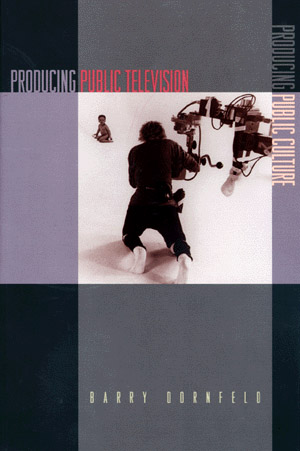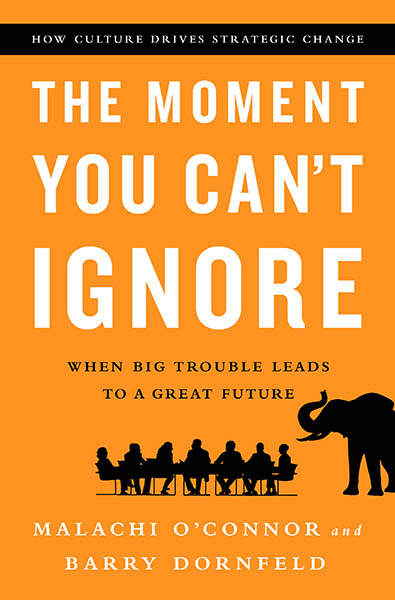Barry Dornfeld’s 1998 book Producing Public Television, Producing Public Culture was a formative one that knocked me from media studies to media anthropology (and made me realize that my “revolutionary” new idea for fieldwork had been scooped). For my first post on the CASTAC Blog as an Associate Editor, I want to return to my intellectual roots to interview Dornfeld, and discuss his transition from NYU assistant professor and University of Pennsylvania Communication program director to ethnography evangelist in the business world.
Producing Public Television saw Dornfeld conducting full-fledged participant observation amidst the producers at PBS while they assembled a transnational documentary called Childhood. This book has influenced both my dissertation and my fieldwork among television producers, particularly for its treatment of expertise. Dornfeld, for example, addresses the degree to which producers consider themselves proxies for their audiences, vehicles for a kind of mass-mediated paternalism, or feel shackled by a necessity to communicate reductively. But in learning about his professional trajectory, I found myself curious about his unconventional movement(s) between academia and industry. And as our potential for engagement with the business (or at least non-academic) world is on the minds of some in the CASTAC community, I thought I’d talk to Dornfeld about his work on media production, the use of ethnography in the business world, and his most recent book on how ethnography can help organizations adjust during periods of intense change. Below, he graciously answers my questions.

De Musica Mundana, Robert Fludd, 1617. Courtesy of Deutsche Fotothek, public domain.
Elizabeth Rodwell: First, how aware are you of the legacy your book “Producing Public Television” has had in anthropology and media studies? What has been the legacy of that publication in your professional life?
Barry Dornfeld: I am aware that some folks still use and refer to the book, which I am pleased to be reminded of after all these years. Not being in academia any more limits my exposure a bit, but I do hear periodically from people who are studying media production and find the book useful. And I have some old colleagues who still assign the book. I think the perspective and method hold up well, even if the world of media and media theory have evolved.
ER: Do you think television corporations have become more sophisticated in their understanding of audiences than they were when you conducted your doctoral fieldwork?
BD: Yes, I believe they have better tools and data to use to understand and anticipate audience reactions and preferences. What does not feel like it has changed is producers’ reflexivity and awareness about themselves as both audiences and producers, and how their own cultural worlds and biases influence what they make and put on television.
ER: After completing your dissertation, how and why did you decide to go into business rather than academia?
BD: It was a long path, which included five years of a wonderful tenure-track teaching position in the Anthropology Department at NYU, working with Faye Ginsburg in the Program in Culture and Media. I then went into consulting for a few years, only to step back out for another academic position starting a new program in Communication at the University of the Arts in Philadelphia, where I worked for another five years. I then returned to CFAR where I have been for close to ten years. The reason for the shift in and out of academia and the business world have been complex. While I enjoyed academia, I felt its limitations in terms of scope of interest, kinds of people to collaborate with, and opportunities for professional and personal growth. The world of consulting has opened up new domains of learning and growth for me, and the idea of building an organization, in our case a small boutique consulting firm, has been a truly satisfying professional project. Ultimately, I may be the kind of person who needs new challenges and new environments to try out, and appreciate the breadth of what I do now versus the narrow depth of the academic pursuit.
ER: What is CFAR? Can you describe the work you do there?
BD: We are a small management consulting firm with offices in Philadelphia and Boston. The firm came out of the Wharton School of Business at Penn more than 25 years ago, and is made up of a smart and eclectic group with diverse training and backgrounds, including social science, architecture, and business. We help organizations be successful by solving difficult problems through strategic thinking, accelerating change, and developing leadership and management capabilities. We specialize in working with organizations in health care, higher education, life sciences, and family business.
ER: Can you comment on a particularly compelling or successful use of ethnography in the business world?
BD: There has some been some excellent work on ethnography in the business world, and vital dialogue about it that would be hard to summarize briefly. Gideon Kunda’s book Engineering Culture is a classic in this way. The challenge in our work is to build in an ethnographic perspective to the work of helping organizations, and to do it in a way that moves them along quickly.
ER: You’ve just published a book with Mal O’Connor called The Moment You Can’t Ignore. What’s the premise?

De Musica Mundana, Robert Fludd, 1617. Courtesy of Deutsche Fotothek, public domain.
BD: A key premise is that organizations often get stuck dealing with turbulent change, and that being stuck is not a bad thing but a place from which to learn and address the need for change. These un-ignorable moments are where ethnography can help guide the way you “listen in” to the organization during these periods of intense change, and tap into elements of your organizational culture that can guide you to a successful future. The book is full of case material — mini-ethnographies if you will — based on our work with organizations where they have been stuck and we have helped get them unstuck. You can learn more at www.unignorablemoment.com.
ER: What feedback have you gotten on this book so far?
BD: The feedback has been excellent, as the book seems to have intrigued people in the business and organizational world about ethnography and a different perspective on change and culture, both of which have been written about in the business world for some time. The case narratives seem to hook people in the way good ethnography can, but also provide some helpful guidance for people who work in organizations and struggle through these times of intense change. [Editor’s note: see links at end for two reviews of the book.]
ER: How aware do you think businesses are of the benefits of ethnographic methods at present? Has that changed since you got into the field?
BD: Not very, though some have heard about the method, particularly in product design and usage studies. The work around design thinking in business has also raised awareness of ethnography. And using ethnography as a tool for leadership development, orientation and learning has a long history in the form of shadowing in the work setting and learning journeys to other sites. People we talk to and who read the book seem to get it pretty quickly and see the value of the method and the mindset. Operationalizing it raises some challenges, but we are working with organizations to do this with a lot of success and have given a lot of thought to making ethnography accessible.
ER: What is your present engagement with academia?
BD: I teach occasional courses and give lectures in several programs at Wharton, NYU, and Goucher College, as well leading executive education sessions. Teaching people in the business world is quite different than teaching graduates and undergrads, so I have had to develop a different toolset to do so, but it can be a lot of fun and offers a lot of opportunity to learn from people with a depth of personal and life experience.
ER: How does an anthropologist with an STS focus begin to engage the business world/move into that sort of career? What skills from graduate school have you found most useful in your present work?
BD: I think many skills academics have are transferable to the world of organizational work — good analytical skills, problem solving, and writing. The rhythm and purpose of this work is quite different, in some ways that challenge those who come from the academy. The need for speed, clarity, and collaboration are not always in that academic skills set, but these are learnable skills.
Endnotes
Two reviews of Dornfeld’s new book with Malachi O’Connor, The Moment You Can’t Ignore:
- On Forbes’ website: Roger Trapp, “Why Culture Could Beat Strategy In These Turbulent Times,” http://www.forbes.com/sites/rogertrapp/2014/10/30/why-culture-could-beat-strategy-in-these-turbulent-times/, Forbes, October 30, 2014.
- In strategy + business: James O’Toole, “Best Business Books 2014: Organizational Culture,” http://www.strategy-business.com/article/00290?pg=all, strategy + business, November 6, 2014.
